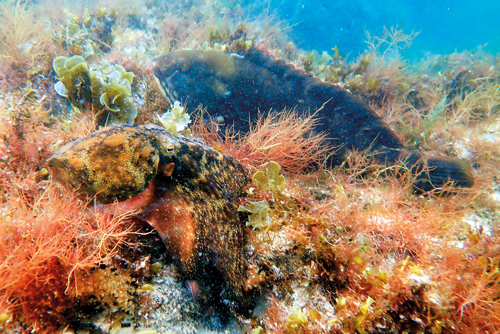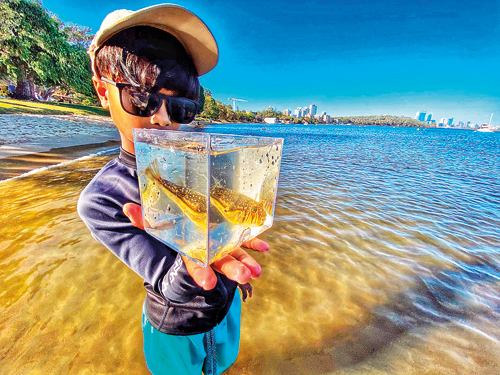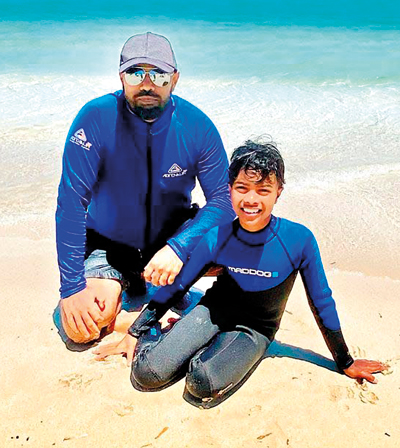Their love for the ocean is deep
| Rehan Somaweera from Perth, aged 10, became one of the youngest Australians to author a scientific paper when he, together with his father Dr. Ruchira Somaweera, recorded ‘nuclear-follower behaviour’ for the first time between the West Australian common octopus and the Brown spotted wrasse fish, which meant the octopus while feeding would flush out food for the fish which come in their wake. Their findings were published in the CSIRO journal in July. In this email interview with Yomal Senerath-Yapa, Rehan and Ruchira, | |
-

Close encounter: West Australian common octopus and the Brown spotted wrasse fish
When did you first spot the interaction between the WA common octopus and the brown-spotted wrasse fish? How did you realize the fish were feeding thanks to the octopus?
Rehan: I first started seeing the interactions about a year back. Octopus always catch my eyes because they are so different to any other sea creature. So when I see octopus while snorkelling, I always have a closer look. I realized that when the octopus moves, the smaller creatures at the bottom started to swim away and the particular wrasse follows it and feeds on those other smaller creatures. We saw this in four reef systems in Perth and on many occasions.
- Is the ocean your favourite ecosystem? Where would you most love to be watching animals? Why?
Rehan: My favourite ecosystem would be the ocean because it is like a completely different world down there, and you are totally oblivious of of what you’re about to see next. But, I love watching animals on land as well. For me, it doesn’t matter where the animals live- each animal is fascinating and unique in their own way.
- Can you sum up for us what draws you to the ocean?

Rehan: Starting young
Rehan: Since I was very little, my parents have been taking me to the beach so I grew up next to the ocean. I started piggy backing on my dad and snorkelling when I was about three. The underwater world and its amazing creatures always made me want to see more and know more about them. Also, we know so little about the ocean.
- How closely do you follow your father’s work as a behavioural ecologist and herpetologist?
Rehan: I follow his footsteps closely, and I love science, but I’m not sure which type of scientist I would be, whether a marine biologist, paleontologist, astrophysicist, herpetologist or something different. My grandparents learnt science and my mum and dad are both scientists. I want to be an even better one.
- Tell us something of yourself?
Rehan: My school is Woodlands Primary School in Perth and I am in Year 5. I do a lot at school – I do basketball, karate, athletics and also play the violin for the orchestra and I am in the junior choir. My favourite subjects are sport, Japanese and math. During my spare time, I do comics with my mates, play Minecraft and spend a lot of time exploring outdoors snorkelling, bushwalking or camping. Perth is an amazing place for all those.
- Can you tell us about writing the paper?

Following in his father’s footsteps: Rehan and Dr Ruchira Somaweera
Rehan: So I collected the data. My dad gave me an underwater slate and a dive watch so I can record the findings while I look at the creatures. We wrote the paper together. I did the first draft but dad changed and updated it a lot. He writes lot of papers so he taught me how to work on a scientific paper.
*******
- Dr. Somaweera could you tell us about your childhood in Sri Lanka and when you came to Australia? How your career as an ecologist and herpetologist began and how much it was inspired by a youth spent in our island?
Ruchira: I have been always fascinated by animals since I could walk (according to my parents) and my childhood passion became a hobby which is now my career. Growing up in a world biodiversity hotspot, I obviously had a lot of creatures to play with and inspired by. After completing my bachelors at the University of Peradeniya, I went to UK for an internship at Cambridge University and the Natural History Museum in London and then came to Australia in 2008 for my PhD. Since then, Australia has been home. However, I do have quite a few projects in other parts of the world including Sri Lanka, Indonesia, Borneo and US. You can see more of my work at www.ruchira-somaweera.net
- What was your involvement with the paper like?
Ruchira: It’s always great to have the opportunity to work with your own kids. I am a big believer of getting kids out into nature and inspiring them through actions. Seeing Rehan and Nehan (6 years) getting into and exploring the ocean are proud dad moments. I guided him to record data properly and also taught him the scientific way of writing a paper. The outcome was received well. Rehan, Nehan and I have also photographed all the fish known from our local pool and designed a poster. Our city council is printing it in large format and displaying it at the beach so people can make use of it. https://b61ef82c-190d-41a2-b3fa-72c90e1175a1.filesusr.com/ugd/0eecb7_eeeaf4d696d5469b9352421ba1582842.pdf


